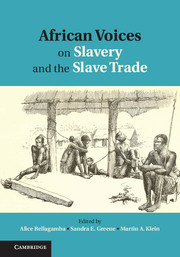Book contents
- African Voices on Slavery and the Slave Trade
- African Voices on Slavery and the Slave Trade
- Copyright page
- Contents
- Figures
- Contributors
- Foreword Beyond the Printed Word
- Introduction Finding the African Voice
- Part One Remembering Slavery and the Slave Trade
- Part Two The Verbal Arts and Everyday Objects
- Part Three Documenting Our Own Histories and Cultural Practices
- Part Four Slavery Observed: European Travelers’ Accounts
- Part Five Administrative Records
- Part Six Legal Records
- 29 Introduction:
- 30 The Expulsion of Dalu ModuA Muslim Trader in Anti-Slavery Freetown
- 31 “Being a Slave, I Was Afraid...”
- 32 Interpreting Gold Coast Supreme Court Records, SCT 5/4/19 Regina (Queen) vs. Quamina Eddoo
- 33 A Tale of Slavery and Beyond in a British Colonial Court Record
- 34 Aballow’s Story
- 35 A Case of Kidnapping and Child Trafficking in Senegal, 1916
- Part Seven Recorded Encounters with the Enslaved: Christian Workers in Africa
- Part Eight Documents from Muslim Africa
- Part Nine Living with the Past
- Index
29 - Introduction:
Voices of Slaves in the Courtroom
from Part Six - Legal Records
Published online by Cambridge University Press: 05 April 2013
- African Voices on Slavery and the Slave Trade
- African Voices on Slavery and the Slave Trade
- Copyright page
- Contents
- Figures
- Contributors
- Foreword Beyond the Printed Word
- Introduction Finding the African Voice
- Part One Remembering Slavery and the Slave Trade
- Part Two The Verbal Arts and Everyday Objects
- Part Three Documenting Our Own Histories and Cultural Practices
- Part Four Slavery Observed: European Travelers’ Accounts
- Part Five Administrative Records
- Part Six Legal Records
- 29 Introduction:
- 30 The Expulsion of Dalu ModuA Muslim Trader in Anti-Slavery Freetown
- 31 “Being a Slave, I Was Afraid...”
- 32 Interpreting Gold Coast Supreme Court Records, SCT 5/4/19 Regina (Queen) vs. Quamina Eddoo
- 33 A Tale of Slavery and Beyond in a British Colonial Court Record
- 34 Aballow’s Story
- 35 A Case of Kidnapping and Child Trafficking in Senegal, 1916
- Part Seven Recorded Encounters with the Enslaved: Christian Workers in Africa
- Part Eight Documents from Muslim Africa
- Part Nine Living with the Past
- Index
Summary
Keywords
- Type
- Chapter
- Information
- Publisher: Cambridge University PressPrint publication year: 2013



